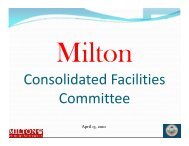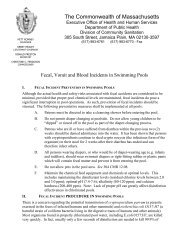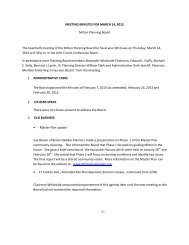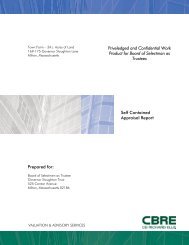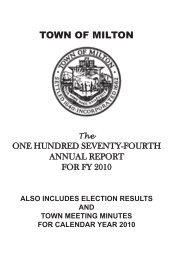2009 Annual Report.pdf - Town of Milton
2009 Annual Report.pdf - Town of Milton
2009 Annual Report.pdf - Town of Milton
You also want an ePaper? Increase the reach of your titles
YUMPU automatically turns print PDFs into web optimized ePapers that Google loves.
MAPC strives to make every major development project in the region compatible<br />
with MetroFuture and the state’s Sustainable Development Principles.<br />
One way we do this is through our active involvement in the Massachusetts Environmental<br />
Protection Act (MEPA) process. Our MEPA comments consistently<br />
seek to minimize and mitigate traffic impacts, to expand transit, bicycle,<br />
and pedestrian alternatives, to safeguard critical environmental resources, to<br />
limit storm water impacts through “Low Impact Development (LID),” and to<br />
encourage a mixture <strong>of</strong> commercial and residential uses.<br />
Better Planning through Technical Assistance<br />
Cities and towns throughout the region continue to seek out MAPC for<br />
technical assistance on a variety <strong>of</strong> issues. Much <strong>of</strong> MAPC’s “on the ground”<br />
technical assistance work for municipalities has been made possible through<br />
funding from the District Local Technical Assistance program (DLTA). This<br />
program was created by the Legislature and Governor Deval Patrick in 2006 to<br />
assist communities with a variety <strong>of</strong> land use planning activities, especially expedited<br />
permitting <strong>of</strong> commercial and industrial projects. The program is now<br />
entering its third funding round, and it has been expanded to assist municipalities<br />
to regionalize planning, procurement and service delivery.<br />
Encouraging and Supporting Collaboration among Municipalities<br />
Subregional councils are a primary means <strong>of</strong> communication between<br />
MAPC and member communities, and MAPC continually seeks to expand participation<br />
in these councils. Each municipality in the MAPC region is included<br />
in one <strong>of</strong> eight subregions, led by a staff coordinator.<br />
Subregions provide a venue for citizen input into regional planning as well as<br />
a forum for local elected <strong>of</strong>ficials, planners, community organizations, legislators<br />
and businesses to exchange information. Over the past year, subregional meetings<br />
addressed a wide variety <strong>of</strong> planning topics, such as the Ocean Management Act,<br />
the Green Communities Act, Scenic Byways, water usage, using GIS, economic<br />
development and more. MAPC also facilitates regional dialogue and joint municipal<br />
action among chief elected and appointed <strong>of</strong>ficials in the region.<br />
MAPC continues to perform fiduciary, planning, and project management<br />
services for the Northeast Homeland Security Regional Advisory Council<br />
(NERAC), managing $4.65 million in grant funding for 85 cities and towns<br />
north and west <strong>of</strong> Boston.<br />
Preparing for Natural Disasters<br />
After recent storm events – such as the Northeast ice storm in December<br />
<strong>2009</strong>, and several heavy rains storms that caused flooding this summer – residents<br />
across the region are more aware than ever <strong>of</strong> the severe effects <strong>of</strong> natural<br />
disasters.<br />
167




